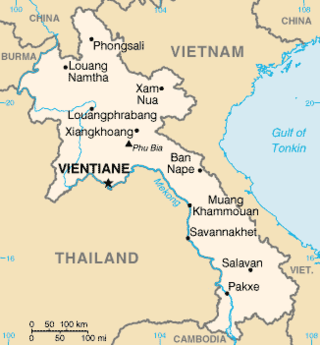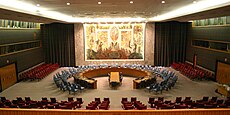
The United Nations Security Council (UNSC) is one of the six principal organs of the United Nations (UN) and is charged with ensuring international peace and security, recommending the admission of new UN members to the General Assembly, and approving any changes to the UN Charter. Its powers as outlined in the United Nations Charter include establishing peacekeeping operations, enacting international sanctions, and authorizing military action. The UNSC is the only UN body with authority to issue resolutions that are binding on member states.

The United Nations General Assembly is one of the six principal organs of the United Nations (UN), serving as its main deliberative, policymaking, and representative organ. Currently in its 78th session, its powers, composition, functions, and procedures are set out in Chapter IV of the United Nations Charter.

The United Nations Truce Supervision Organization (UNTSO) is an organization founded on 29 May 1948 for peacekeeping in the Middle East. Established amidst the 1948 Arab–Israeli War, its primary task was initially to provide the military command structure to the peacekeeping forces in the Middle East to enable the peacekeepers to observe and maintain the ceasefire, and in assisting the parties to the Armistice Agreements in the supervision of the application and observance of the terms of those Agreements. The organization's structure and role has evolved over time as a result of the various conflicts in the region and at times UNTSO personnel have been used to rapidly deploy to other areas of the Middle East in support of other United Nations operations. The command structure of the UNTSO was maintained to cover the later peacekeeping organisations of the United Nations Disengagement Observer Force (UNDOF) and the United Nations Interim Force in Lebanon (UNIFIL) to which UNTSO continues to provide military observers.
The Military Staff Committee (MSC) is the United Nations Security Council subsidiary body whose role, as defined by the United Nations Charter, is to plan UN military operations and assist in the regulation of armaments. Although the Military Staff Committee continues to exist, negotiation efforts between the United States, the Soviet Union and other nations in the late 1940s failed, and the committee has since been largely defunct, only serving in an advisory capacity.
Chapter VII of the United Nations Charter sets out the UN Security Council's powers to maintain peace. It allows the Council to "determine the existence of any threat to the peace, breach of the peace, or act of aggression" and to take military and nonmilitary action to "restore international peace and security".

United Nations Security Council Resolution 49, adopted on May 22, 1948, considering that the previous resolutions of the Security Council in respect to Palestine have not been complied with and that military operations were still taking place in Palestine, the resolution called upon all governments and authorities to abstain from any further hostile military action in Palestine and to that end issue a cease-fire order to their military and paramilitary forces to come into effect at noon, May 24, 1948, New York City local time. The resolution further ordered the Truce Commission for Palestine set up in United Nations Security Council Resolution 48 to report to the Council on the compliance of the concerned parties with the resolution.
The following outline is provided as an overview of and topical guide to the United Nations:

United Nations Security Council Resolution 54, adopted on 15 July 1948, determined that the situation in Palestine constitutes a threat to the peace within the meaning of Article 39 of the Charter of the United Nations. The resolution ordered all governments and authorities concerned to desist from further military action and to issue a cease-fire to their military and paramilitary forces to take effect at a time to be determined by the mediator in the next three days. It also declared that failure to comply with these orders would demonstrate the existence of a breach of the peace within the meaning of article 39 of the Charter and would require immediate consideration by the Council.
United Nations Security Council Resolution 55, adopted on July 29, 1948, having receiving a report from the Committee of Good Offices about a standstill in political and trade negotiations in Indonesia, the Council called upon the governments of the Netherlands and the Republic of Indonesia to maintain strict observance of both the military and economic elements of the Renville Agreement and to implement early and fully its twelve political principles.

United Nations Security Council Resolution 72, adopted on August 11, 1949, after receiving a report by the Acting United Nations Mediator in Palestine on the completion of his responsibilities, the UN decided to pay tribute to the late Count Folke Bernadotte, the then current Acting Mediator Dr. Ralph J. Bunche and the Belgian, French, Swedish and American officers who served on the staff and as military observers in Palestine.

United Nations Security Council Resolution 89, adopted on November 17, 1950, after receiving complaints from Egypt, Israel, Jordan and the Chief of Staff of the Truce Supervision Organization regarding the implementation of the Armistice Agreements designed to end the Arab-Israeli War the Council requested the Egypt-Israel Mixed Armistice Commission give urgent attention to a complaint of expulsion of thousands of Palestinian Arabs. The Council called upon both parties to give effect to any finding by the Commission, repatriating any such Arabs who the Commission believes to be entitled to return. The Council then authorized the Chief of Staff of the Truce Supervision Organization to recommend to Israel, Egypt and such other Arab States appropriate steps he may consider necessary to control the movement of nomadic Arabs across international frontiers or armistice lines by mutual agreement.

United Nations Security Council Resolution 132, adopted on September 7, 1959, decided to appoint a sub-committee consisting of Argentina, Italy, Japan and Tunisia, and instructed it to examine statements made before the Council concerning Laos and to receive further statements and documents, and make inquiries and report to the Council as soon as possible. It was the only resolution adopted by the Security Council in 1959.

United Nations Security Council resolution 665, adopted on 25 August 1990, after demanding the full and immediate implementation of resolutions 660, 661, 662 and 664, the council authorised a naval blockade to enforce the embargo against Iraq, in the aftermath of its invasion of Kuwait on 2 August 1990.

United Nations Security Council resolution 864, adopted unanimously on 15 September 1993, after reaffirming resolutions 696 (1991), 747 (1992), 785 (1992), 793 (1992), 804 (1993), 811 (1993), 823 (1993), 834 (1993) and 851 (1993), the Council noted the continuing situation in Angola and went on to condemn and place international sanctions on UNITA.

United Nations Security Council resolution 1157, adopted unanimously on 20 March 1998, after reaffirming Resolution 696 (1991) and all subsequent resolutions on Angola, the Council increased the number of civilian police monitors by up to 83 personnel to assist both the Angolan government and UNITA resolve issues in the peace process and reduced the military component of the United Nations Observer Mission in Angola (MONUA).

United Nations Security Council resolution 1327, adopted unanimously on 13 November 2000, after recalling Resolution 1318 (2000) adopted at the Millennium Summit and receiving the Report of the Panel on United Nations Peacekeeping, the Council adopted a resolution concerning the improvement of its peacekeeping operations.

The permanent members of the United Nations Security Council are the five sovereign states to whom the UN Charter of 1945 grants a permanent seat on the UN Security Council: China, France, Russia, United Kingdom, and United States.











